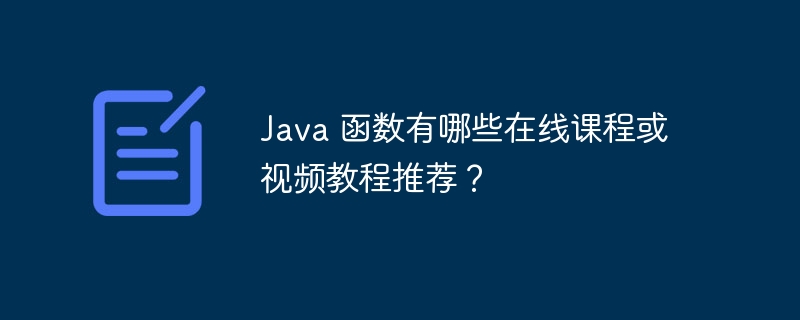Home >Java >javaTutorial >What online courses or video tutorials are recommended for Java functions?
What online courses or video tutorials are recommended for Java functions?
- WBOYWBOYWBOYWBOYWBOYWBOYWBOYWBOYWBOYWBOYWBOYWBOYWBOriginal
- 2024-04-28 14:06:01485browse
Java function declaration contains access modifiers, return type, function name, parameter list and function body. A function is called by its name followed by the parameters passed in parentheses.

The ultimate guide to declaring and calling functions in Java
In Java, a function is a set of functions that are executed in a specific order Statements that accept input and produce output. Learning how to declare and call functions is crucial for any programmer who wants to master Java.
Function declaration
The declaration of a function in Java contains the following components:
-
Access modifier:Specify who Can access the function (for example,
public,protected) -
Return type: The type of value returned by the function (for example,
int,String) - Function name: The name that identifies the function
-
Parameter list: Input received by the function , enclosed in parentheses (for example,
(int x, String y)) -
Function body: The collection of statements executed by the function, enclosed in curly braces (For example,
{ ... })
Function Calls
To call a function, just use the function name followed by parentheses Any parameter passed in will do:
// 调用 calculateAverage() 函数 double average = calculateAverage(5, 10);
Real-time case: Calculating the average
The following is an example of a Java function that calculates the average of two numbers:
public static double calculateAverage(int num1, int num2) {
double sum = num1 + num2;
return sum / 2;
}The function is declared public (public), returns a double value (double), is named calculateAverage(), and accepts Two integer parameters (num1 and num2). It calculates the sum of two numbers and then divides it by 2 to get the average.
Recommended learning resources
- Codecademy’s Java course: https://www.codecademy.com/learn/learn-java
- Java Tutorial on Udemy: https://www.udemy.com/course/java-tutorial/
- Java for Beginners Playlist on YouTube : https://www.youtube.com/watch?v=ou_sB67Q144&list=PLmOn9nNkQxJEqCNXBu5ozT_2mAn-__t3L
The above is the detailed content of What online courses or video tutorials are recommended for Java functions?. For more information, please follow other related articles on the PHP Chinese website!

